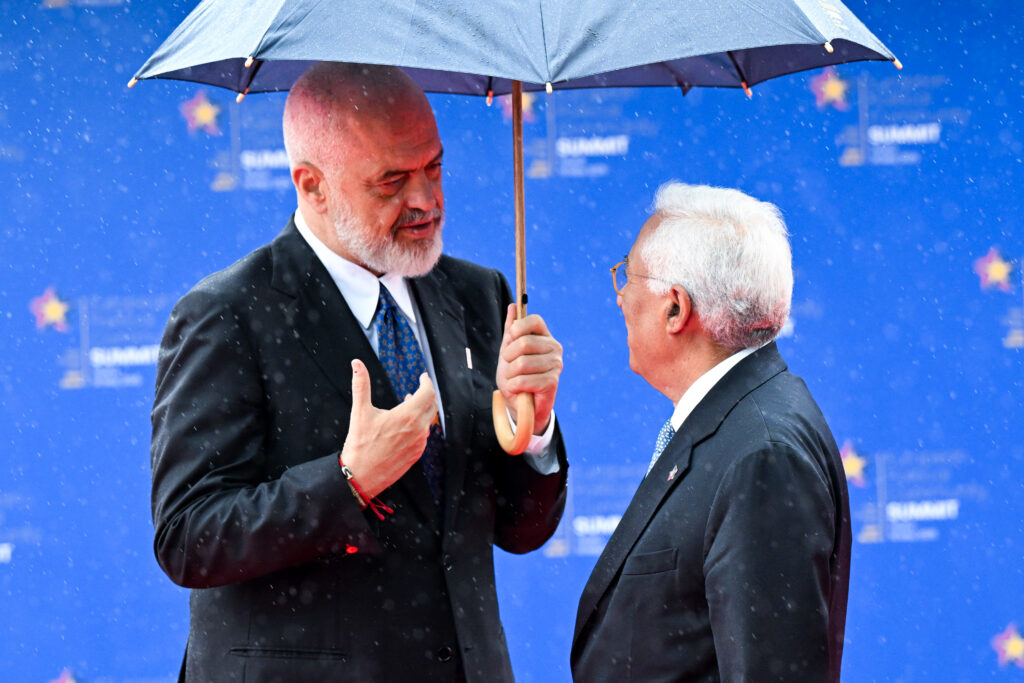Brussels – “The New Europe in a new world.” It was under this motto that the sixth summit of the European Political Community (EPC), the informal forum that brings together leaders from 47 countries of geographic Europe, was held today in Tirana. Co-chaired by Albanian Prime Minister Edi Rama and the President of the European Council, António Costa, the meeting focused on security, competitiveness, and immigration. Also among the hottest topics was the Ukraine war, with Volodymyr Zelensky criticising the busted flush of the Istanbul talks and the EU leadership promising new sanctions against Moscow.
The “big names” of the Old Continent met today (May 16) in Tirana: the leaders of the Twenty-Seven and those of almost all non-EU countries (with the exception of Russia and Belarus), the EU top brass, and the leaders of multilateral organisations such as NATO and the Council of Europe.
The meeting was co-chaired by the host, Albanian Prime Minister Edi Rama fresh from re-election (his fourth in a row, though with some shadows), and António Costa, the president of the European Council who has just concluded a three-day tour of the Western Balkans to emphasise Brussels’ commitment to the enlargement dossier.

But all eyes (or almost) were on Volodymyr Zelensky, who, from the Tirana summit, commented on the rather disappointing outcome of the first direct talks between the Moscow and Kyiv delegations since March 2022, held in the morning in Istanbul in the presence of Turkish and U.S. mediators.
As most observers had expected, the meeting (which lasted less than two hours) did not result in any agreement on a ceasefire, which at the moment remains a pipe dream, but did give the green light to the exchange of 1,000 prisoners per side. The negotiating teams reportedly discussed, on a preliminary basis, some proposals for a truce and, it seems, also the possibility of a top-level meeting between Zelensky and Vladimir Putin.
The Ukrainian president had an exchange on the issue with his French counterpart, Emmanuel Macron, German Chancellor Friedrich Merz, British Prime Minister Keir Starmer, and Polish Prime Minister Donald Tusk. The five spoke briefly on the phone with Donald Trump (who announced that he would like to see his Russian counterpart as soon as possible) to reiterate that “pressure on Russia must be maintained until Russia is ready to end the war.” However, Italian Prime Minister Giorgia Meloni, who seems to have had enough of the staged moments with Rama, was absent from the restricted meeting.
Spoke with @POTUS together with President Macron, Federal Chancellor Merz, Prime Ministers Starmer and Tusk. We discussed the meeting in Istanbul.
Ukraine is ready to take the fastest possible steps to bring real peace, and it is important that the world holds a strong stance.… pic.twitter.com/CG3pAnN5Ip
– Volodymyr Zelenskyy (@ZelenskyyUa) May 16, 2025
In response to Moscow’s unwillingness to sit down at the negotiating table, Ursula von der Leyen and Kaja Kallas announced from the EPC frame that Brussels will get to work to package a new round of sanctions against the Kremlin, a few days later from the approval (at the level of member state ambassadors) of the 17th package of restrictive measures.
The head of the EU executive stressed that “sanctions on Nord Stream 1 and Nord Stream 2” (the gas pipelines linking Russia to Germany via the Baltic Sea), among other things, will be included, while the High Representative repeated that Putin’s absence in Istanbul shows that the czar “is not serious” about the negotiation process. Opinion also shared by NATO Secretary General Mark Rutte, for whom it was “a mistake” on the part of the Federation to send a low-level delegation to the Bosporus.

After the first plenary session (and an opening ceremony in which AI-generated “childlike” versions of the leaders present at the summit were projected on a giant screen), the heads of state and governments sat around three thematic round tables.
The first dealt with security (including the Ukrainian dossier) and democratic resilience; the second with economic competitiveness; and the third with migration, mobility, and youth. At the end of the proceedings, a second plenary session was held to set the date for the next EPC summit, scheduled for autumn in Denmark.
English version by the Translation Service of Withub







